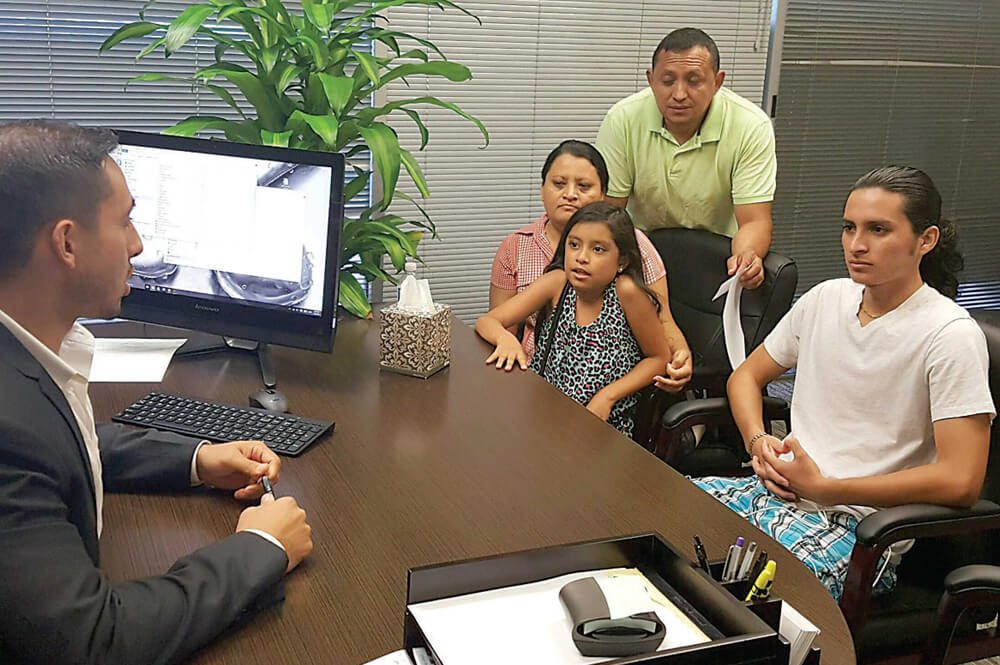A family-based Immigration lawyer in El Paso, Texas specializes in helping individuals navigate the complex legal processes involved in family-based immigration to the United States. These legal professionals assist families in reuniting or staying together by helping them understand and follow U.S. immigration laws. Family-based immigration is one of the most common ways that foreign nationals can obtain legal residency (green card) or citizenship in the U.S., but it involves many legal procedures, eligibility requirements, and potential challenges. A family-based immigration attorney ensures that their clients meet these requirements and successfully complete the application processes.
In this blog, we will cover the essential role of a family-based immigration attorney, the types of visas they help with, the processes they handle, and why it’s crucial to have legal representation. We will also explore common questions families have and provide a table that breaks down different family-based immigration options.
Role of a Family-Based Immigration lawyer in El Paso, Texas
Family-based immigration attorneys play a critical role in helping families overcome the challenges and obstacles involved in bringing loved ones to the United States or maintaining their legal status. They are experts in immigration law and can guide individuals through the paperwork, deadlines, and various procedures that are necessary to achieve family reunification. Below are the key functions and services these attorneys offer:
Legal guidance and consultation
One of the most crucial services that a family-based Immigration lawyer in El Paso, Texas provides is consultation. They help individuals and families understand their immigration options and rights under U.S. law. Whether a family member is applying for a visa, green card, or citizenship, an immigration attorney provides tailored legal advice that clarifies the best course of action. This includes:
- Determining eligibility: Not everyone is eligible for family-based immigration. Attorneys assess the relationship between the petitioner and the beneficiary, as well as the beneficiary’s legal standing, to determine which visa or application is appropriate.
- Legal strategy: Once eligibility is determined, the attorney helps families choose the right strategy. This might involve choosing between consular processing and adjustment of status, depending on the situation.
- Document preparation: Immigration processes require substantial documentation. Attorneys ensure that all required documents are collected, prepared, and submitted properly to avoid delays or denials.
Visa petition and application support
Family-based immigration generally involves filing petitions or applications to bring family members to the U.S. or adjust their legal status if they are already in the country. Family-based immigration attorneys assist with various types of visa petitions:
- Immediate relative petitions: This type of visa is available for spouses, children (under 21), and parents of U.S. citizens. The attorney will help with the I-130 petition, which establishes the relationship between the U.S. citizen and the foreign relative.
- Family preference petitions: These visas apply to more distant family members, like siblings and adult children. The waiting period for family preference visas is typically longer, and the attorney will navigate the complex visa bulletin system to track priority dates.
- Adjustment of status: For relatives already in the U.S. who wish to apply for a green card without leaving the country, an attorney assists with the adjustment of status process, including filing the I-485 form and supporting documentation.
Overcoming legal challenges
Not all family-based immigration cases are straightforward. Some face complications, such as inadmissibility issues, prior deportations, or criminal history, which could hinder or prevent a successful application. A family-based Immigration lawyer in El Paso, Texas helps resolve these issues by filing waivers or appealing decisions. Examples include:
- Inadmissibility waivers: If a relative is found inadmissible for reasons such as unlawful presence or certain health conditions, an attorney can help file a waiver, demonstrating hardship to the U.S. citizen petitioner if the relative is denied entry.
- Appeals and motions: If a visa petition or application is denied, an immigration attorney can file an appeal or motion to reopen the case. They work to build a stronger case with new evidence or legal arguments to increase the chances of approval.

Types of Family-Based Visas
Family-based immigration in the U.S. is divided into two main categories: immediate relative visas and family preference visas. Each visa type has its own eligibility criteria, processing time, and quota limits. Understanding these categories is essential for families seeking to reunite in the U.S. Let’s explore the different types of family-based visas and how a family-based Immigration lawyer in El Paso, Texas can assist in obtaining them.
Immediate relative visas
Immediate relative visas are reserved for close family members of U.S. citizens. These visas have no numerical limit, meaning there is no waiting list, and they are processed relatively quickly. The most common types include:
- IR-1 (Spouse of a U.S. Citizen): This visa is for spouses of U.S. citizens. The immigration attorney helps ensure that the marriage is legitimate and meets all legal requirements.
- IR-2 (Unmarried Children Under 21 of U.S. Citizens): This visa allows the children of U.S. citizens to obtain lawful permanent residency.
- IR-5 (Parents of U.S. Citizens): A U.S. citizen who is at least 21 years old can petition for their parents to obtain a green card through the IR-5 visa.
Family preference visas
Unlike immediate relative visas, family preference visas have an annual limit. These visas are for more distant family relationships, and the waiting periods can be long due to the limited number of available visas each year. The family preference categories are:
- F1 (Unmarried Sons and Daughters of U.S. Citizens): This visa is for adult, unmarried children of U.S. citizens.
- F2A (Spouses and Children of Lawful Permanent Residents): This visa is for the spouses and minor children of green card holders.
- F2B (Unmarried Sons and Daughters of Lawful Permanent Residents): Adult, unmarried children of green card holders are eligible for this visa.
- F3 (Married Sons and Daughters of U.S. Citizens): U.S. citizens can petition for their married children to obtain a green card, though the wait time can be lengthy.
- F4 (Brothers and Sisters of U.S. Citizens): U.S. citizens over the age of 21 can petition for their siblings under this category, but it is subject to long waiting periods.
K Visas (Fiancé Visas)
In addition to immediate relative and family preference visas, a family-based Immigration lawyer in El Paso, Texas can also help with K visas, which allow a fiancé or fiancée of a U.S. citizen to enter the U.S. with the intent to marry. After marriage, the foreign spouse can apply for adjustment of status to become a lawful permanent resident.

Why you need a Family-Based Immigration lawyer in El Paso, Texas
Navigating the U.S. immigration system is notoriously complex, with ever-changing laws, regulations, and procedures that can be overwhelming for anyone unfamiliar with the process. Family-based immigration is no exception, and even minor mistakes can result in delays, additional costs, or worse—denials. This is where the expertise of a family-based immigration attorney becomes essential. Here are several reasons why having an experienced lawyer on your side is invaluable:
Expertise in Immigration lawyer in El Paso, Texas
Immigration law is a highly specialized field, and family-based immigration attorneys have in-depth knowledge of the legal framework surrounding visa petitions, green cards, and citizenship applications. They stay updated on any changes in immigration policies, laws, and executive orders that could affect your case. Without expert legal guidance, applicants might overlook critical requirements or misunderstand important steps, which could lead to delays or rejections.
For example, a seemingly simple mistake in an I-130 petition (the petition for an alien relative) can result in a Request for Evidence (RFE) from U.S. Citizenship and Immigration Services (USCIS), further delaying the process. A family-based Immigration lawyer in El Paso, Texas ensures that every form is completed accurately and every document is in order to avoid such setbacks.
Tailored legal strategy
Each immigration case is unique, depending on the individual’s situation, family dynamics, and legal standing. An experienced attorney will evaluate your case and create a personalized legal strategy that maximizes your chances of success. For instance, if you are deciding between consular processing and adjustment of status for a relative already in the U.S., your attorney will help you understand the benefits and drawbacks of each option and recommend the best course of action.
Additionally, some cases may involve complications such as prior visa denials, overstays, or inadmissibility issues. A family-based immigration attorney can assess these complications and develop a strategy to overcome them, whether through waivers, appeals, or other legal remedies.
Accurate and complete documentation with Immigration lawyer in El Paso, Texas
Filing a successful family-based immigration petition requires extensive documentation to prove relationships, legal status, financial stability, and more. Missing documents, incorrect information, or incomplete forms can cause significant delays or even result in the denial of an application. A family-based immigration attorney ensures that all necessary documentation is gathered, correctly prepared, and submitted on time.
For example, proving a marital relationship for a spousal visa may require submitting evidence such as joint financial accounts, shared leases, or affidavits from friends and family. An attorney can help determine the best types of evidence to provide, ensuring that your case meets USCIS’s stringent requirements.
Assistance with complex cases
Not all family-based immigration cases are straightforward. Some may involve issues that require additional legal steps, such as applying for waivers of inadmissibility. If a family member is deemed inadmissible due to unlawful presence, criminal history, or medical reasons, an attorney can file the appropriate waiver, demonstrating that the denial would cause extreme hardship to the U.S. citizen or permanent resident petitioner.
Moreover, if your petition is denied or you receive an unfavorable decision, an attorney can file motions to reopen or appeals to contest the decision. They can represent you in front of the Board of Immigration Appeals (BIA) or during immigration court proceedings, ensuring that you have a fighting chance to reverse any negative outcomes.
Avoiding delays and denials
One of the biggest risks of filing an immigration petition without legal representation is the possibility of costly delays or outright denials. An experienced immigration attorney knows how to avoid the common pitfalls that lead to these outcomes, such as incomplete forms, missing signatures, or failure to provide sufficient evidence.
A family-based immigration attorney also stays on top of deadlines and knows the processing times for different visa categories. They can advise you on how long your case will take and monitor its progress to ensure everything moves forward as smoothly as possible. In some cases, attorneys can expedite processing when time is of the essence, such as for medical emergencies or urgent family reunifications.
Peace of mind
Going through the immigration process can be emotionally taxing for families. Having a skilled attorney handle your case gives you peace of mind, knowing that a professional is working to ensure the best possible outcome. You won’t have to worry about filling out confusing forms, gathering complicated documents, or dealing with government agencies on your own.
An immigration attorney is your advocate, fighting for your rights and best interests throughout the process. This level of support is especially important for families who may face challenges, such as language barriers, that could otherwise complicate their efforts to stay together.
Maximizing your chances of success with Immigration lawyer in El Paso, Texas
Ultimately, hiring a family-based immigration attorney increases your chances of a successful petition or application. While no attorney can guarantee an outcome, having an experienced legal professional by your side gives you a significant advantage. They know how to present your case in the best light, follow proper legal procedures, and address any issues that arise during the process.
Whether you are petitioning for a spouse, child, parent, or sibling, an immigration attorney helps ensure that your case is as strong as possible, minimizing the risk of errors and maximizing your likelihood of success.
FAQs about Family-Based Immigration lawyer in El Paso, Texas
1. What is the difference between an immediate relative visa and a family preference visa?
Immediate relative visas are for close family members like spouses, children, and parents of U.S. citizens and have no annual limit, meaning they are processed more quickly. Family preference visas are for more distant relatives, such as siblings and adult children, and are subject to yearly caps, leading to longer wait times.
2. Can I bring my sibling to the U.S. through family-based immigration?
Yes, U.S. citizens can petition for their brothers and sisters under the F4 family preference category. However, due to the annual visa limit, this process can take several years.
3. How long does it take to get a family-based green card?
The time frame varies based on the relationship between the petitioner and the beneficiary. Immediate relative visas are typically processed within months, while family preference visas can take several years due to visa availability.

Table: Types of family-based visas, eligibility, and processing times
| Visa category | Eligibility requirements | Processing time |
|---|---|---|
| IR-1 (Spouse of U.S. Citizen) | Must be legally married to a U.S. citizen | 8-12 months |
| IR-2 (Child of U.S. Citizen) | Unmarried child under 21 of a U.S. citizen | 6-12 months |
| IR-5 (Parent of U.S. Citizen) | Parent of a U.S. citizen who is at least 21 years old | 8-12 months |
| F1 (Adult Child of U.S. Citizen) | Unmarried adult child of a U.S. citizen | Several years (dependent on visa availability) |
| F2A (Spouse of Green Card Holder) | Spouse or minor child of a lawful permanent resident | 1-2 years (dependent on visa availability) |
| F4 (Sibling of U.S. Citizen) | Sibling of a U.S. citizen over 21 years old | Several years (longer wait times) |
| K-1 (Fiancé Visa) | Fiancé of a U.S. citizen, must marry within 90 days of entering the U.S. | 6-9 months |
Conclusion
Family-based immigration is a path to keeping families together in the U.S., but it involves navigating a complex system that requires careful attention to detail. A family-based Immigration lawyer in El Paso, Texas plays an essential role in guiding families through the legal process, from filing petitions to addressing legal challenges. Their expertise ensures that families have the best chance of successfully reuniting in the United States. If you’re considering family-based immigration, working with an experienced attorney can provide you with peace of mind and significantly improve your chances of a smooth and successful process.





